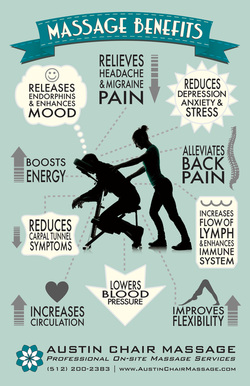
Benefits of Massage
The National Institute of Health estimates that upwards of 90% of disease is stress-related. Massage is an effective tool for managing this stress, which translates into:
The National Institute of Health estimates that upwards of 90% of disease is stress-related. Massage is an effective tool for managing this stress, which translates into:
- Decreased anxiety.
- Enhanced sleep quality.
- Greater energy.
- Improved concentration.
- Increased circulation.
- Reduced fatigue.
- Alleviate low-back pain and improve range of motion.
- Enhance immunity by stimulating lymph flow—the body's natural defense system.
- Pump oxygen and nutrients into tissues and vital organs, improving circulation.
- Release endorphins—amino acids that work as the body's natural painkiller.
- Lessen depression and anxiety.
- Relieve migraine pain.
- Exercise and stretch weak, tight, or atrophied muscles.
- Improve the condition of the body's largest organ—the skin.
- Increase joint flexibility.
- Promote tissue regeneration, reducing scar tissue and stretch marks.
- Reduce post-surgery adhesions and swelling.
- Reduce spasms and cramping.
- Relax and soften injured, tired, and overused muscles.